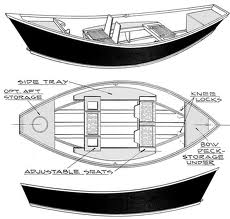
Beyond the Lines: Unveiling Hidden Considerations in Choosing Wooden Boat Blueprints
Building a wooden boat is a journey of passion, skill, and meticulous planning. While countless resources exist on selecting boat designs, we often overlook nuanced aspects that can significantly impact the build's success and enjoyment. This article delves into those often-missed details, offering fresh perspectives for hobbyists, professionals, and anyone dreaming of crafting their wooden vessel.
The Blueprint Beyond the Specs: What They Don't Tell You
Most blueprint reviews focus on the obvious: hull design, dimensions, and sail plan (if applicable). But what about the less tangible factors?
Q: How do blueprints reflect the builder's skill level?
A: This is crucial but seldom addressed. A beautifully detailed, complex design might be a masterpiece for a seasoned craftsman, but a nightmare for a beginner. Look beyond the glamour shots. Examine the joinery details. Are they simple lap joints suitable for a novice, or intricate scarf joints demanding advanced skills and precision tools? Consider your skill level honestly â€" choose blueprints matching your capabilities, not your aspirations. Don't let the allure of a challenging design lead to frustration and a half-finished project. For example, a simple clinker-built dinghy might be a better starting point than a complex 30-foot sloop.
Q: What about the wood itself â€" does the blueprint consider the material?
A: Many plans assume readily available lumber. But what if your region primarily sources cedar, while the blueprint specifies oak? Investigate lumber availability and cost in your area *before* committing to a design. This often-overlooked step can save you from costly delays or compromises on wood quality. Perhaps you need to adapt the design slightly to suit the wood you can source. Remember, certain woods are better suited for specific boat styles and applications.
Beyond the Drawing Board: Real-World Considerations
Let's move beyond the theoretical and consider practical aspects that often get overlooked.
Story: The Case of the Missing Hardware
A friend spent months building a beautiful yacht based on a seemingly comprehensive set of blueprints. However, the plans lacked detail on critical hardware like fastenings. He ended up spending weeks researching suitable screws, bolts, and rivets â€" adding significant time and unexpected costs to his project. Always consider the hardware requirements upfront. Look for blueprints that include a comprehensive hardware list or, at the very least, specifications for the types and sizes needed. Contact the designer or other builders who've used the same plans to glean practical advice.
Q: How does the building environment influence blueprint choice?
A: Do you have access to a large, climate-controlled workshop? Or are you building in a small garage or even outdoors? The complexity of the design should align with your building environment. A complex, multi-stage build is unsuitable for limited space or unpredictable weather. Choose a design appropriate to your workspace. This might mean selecting a smaller boat or one with simpler construction techniques.
The Future of Wooden Boat Blueprints: Digitalization and Beyond
The field is evolving. Traditional blueprints are increasingly supplemented by digital 3D models and virtual reality tools, allowing for better visualization and easier modification. This also allows for better integration with Computer Numerical Control (CNC) cutting, providing greater precision and efficiency.
Choosing the right wooden boat blueprints is a critical first step. By considering these often-overlooked factors and embracing new digital tools, you'll increase your chances of a successful and rewarding build, turning your dream into a reality, one carefully chosen plank at a time.








No comments:
Post a Comment
Note: Only a member of this blog may post a comment.